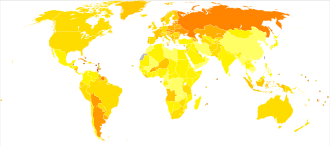Uterine cancer
| Uterine cancer | |
|---|---|
 | |
| Classification and external resources | |
| ICD-10 | Xxx.x |
| ICD-9-CM | xxx |
| Patient UK | Uterine cancer |
Uterine cancer or womb cancer is any type of cancer that emerges from the tissue of the uterus. It can refer to several types of cancer, with cervical cancer (arising from the lower portion of the uterus) being the most common type worldwide and the second most common cancer in women in developing countries.[1] Endometrial cancer (or cancer of the inner lining of the uterus) is the second most common type, and fourth most common cancer in women from developed countries.[1] Risk factors depend on specific type, but obesity, older age, and human papillomavirus infection add the greatest risk of developing uterine cancer.[2][3] Early on, there may be no symptoms, but irregular vaginal bleeding, pelvic pain or fullness may develop.[2][3] If caught early, most types of uterine cancer can be cured using surgical or medical methods. When the cancer has extended beyond the uterine tissue, more advanced treatments including combinations of chemotherapy, radiation therapy, or surgery may be required.[2][3]
Types
The terms uterine cancer and womb cancer may refer to any of several different types of cancer which occur in the uterus, namely:
- Endometrial carcinomas originate from cells in the glands of the endometrium (uterine lining). These include the common and readily treatable well-differentiated endometrioid adenocarcinoma, as well as the more aggressive uterine papillary serous carcinoma and uterine clear-cell carcinoma.
- Endometrial stromal sarcomas originate from the connective tissues of the endometrium, and are far less common than endometrial carcinomas.
- Malignant mixed Müllerian tumors are rare endometrial tumors which show both glandular (carcinomatous) and stromal (sarcomatous) differentiation – carcinosarcoma behaves similar to a high grade carcinoma, and it is felt to be of epithelial origin rather than true sarcoma.
- Cervical cancer arises from the transformation zone of the cervix, the lower portion of the uterus and connects to the upper aspect of the vagina.
- Uterine sarcomas: sarcomas of the myometrium, or muscular layer of the uterus, are most commonly leiomyosarcomas.
- Gestational trophoblastic disease relates to neoplastic processes originating from tissue of a pregnancy that often is located in the uterus.
Causes
It is not known with certainty what the causes for uterine cancer may be, though hormone imbalance is speculated as a risk factor. Estrogen receptors, known to be present on the surfaces of the cells of this type of cancer, are thought to interact with the hormone causing increased cell growth, which can then result in cancer. The exact mechanism of how this occurs is not understood.[4]
Epidemiology

Uterine cancer resulted in about 58,000 deaths in 2010 up from 45,000 in 1990.[6]
Uterine cancer is the fourth most common cancer in women in the UK (around 8,500 women were diagnosed with the disease in 2011), and it is the tenth most common cause of cancer death in women (around 2,000 people died in 2012).[7]
References
- 1 2 Jemal, A; Bray, F; Center, MM; Ferlay, J; Ward, E; Forman, D (2011). "Global cancer statistics.". CA: A Cancer Journal for Clinicians. 61 (2): 69–90. doi:10.3322/caac.20107. PMID 21296855.
- 1 2 3 Hoffman, Barbara (2011). "Chapter 33. Endometrial Cancer". Williams gynecology (2nd ed.). New York: McGraw-Hill Medical. ISBN 978-0-07-171672-7.
- 1 2 3 Hoffman, Barbara L. (2011). "Chapter 30. Cervical Cancer". Williams gynecology (2nd ed.). New York: McGraw-Hill Medical. ISBN 978-0-07-171672-7.
- ↑ Causes, Risk Factors, and Prevention TOPICS - Do we know what causes endometrial cancer? - cancer.org - American Cancer Society - Retrieved 5 January 2015.
- ↑ "WHO Disease and injury country estimates". World Health Organization. 2009. Retrieved Nov 11, 2009.
- ↑ Lozano, R (Dec 15, 2012). "Global and regional mortality from 235 causes of death for 20 age groups in 1990 and 2010: a systematic analysis for the Global Burden of Disease Study 2010.". Lancet. 380 (9859): 2095–128. doi:10.1016/S0140-6736(12)61728-0. PMID 23245604.
- ↑ "Uterine cancer statistics". Cancer Research UK. Retrieved 28 October 2014.